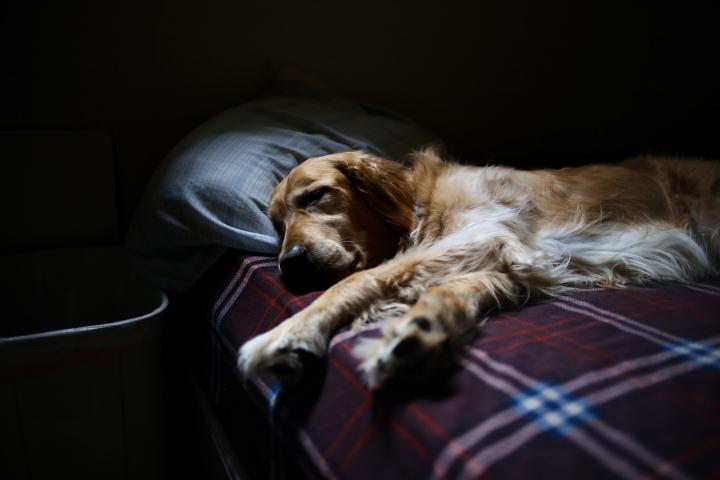
As an advocate for health and wellbeing among veterinary care providers, I often lecture and blog about the importance of sleep hygiene. (Hint: this has nothing to do with the cleanliness of your bed sheets, but everything to do with the activities you do to help fall asleep [and stay asleep] each night.)
Among my top recommendations for improving sleep hygiene: turn off technology 1-2 hours before bedtime in an effort to reduce exposure to blue light (suppresses melatonin release); spend 20-30 minutes outside every day to help regulate the circadian rhythm (sleep-wake cycle); exercise for 30 minutes each day (to help the body feel ready for rest by the time bedtime rolls around); and establish a bedtime routine that you perform every night (to help the mind and body know that it is time to wind down and relax in preparation for sleep).
I am constantly researching and learning new things about sleep hygiene and, as a veterinarian and pet owner, I have often wondered: do people who struggle with their sleep have pets in their bedroom that keep them up at night?
I am clearly not the only person to question this, as researchers at the Center for Sleep Medicine at the Mayo Clinic in Arizona began to investigate sleep struggles among pet owners in 2015. Researchers surveyed 150 consecutive human patients with sleep disorders by questionnaire or interview and found that 49% were pet owners and 41% of pet owners had multiple pets. More than half of those pet owners (56%) allowed their pets to sleep in the bedroom. Interestingly, 20% described their pets as “disruptive”, whereas 41% perceived their pets as “unobtrusive or even beneficial to sleep”.
I happen to agree with the latter of the two groups: my Standard Poodle “Faith” slept with me every night, on my bed until her arthritis got worse and she preferred to sleep on her bed on the floor of my bedroom. After she passed away, her presence in the room was missed and my sleep felt very disrupted – much more so than when she was alive and sharing the bedroom with me!
So, how does the presence of pets in the bedroom affect people who don’t have sleep disorders?
A recent study performed by the Mayo Clinic helped to answer this question. Between August and December 2015, researchers evaluated the sleep of people and dogs sleeping in the same bedroom to determine the impact on sleep. There were 40 healthy adults (without sleep disorders) and their dogs (no puppies < 6 months old). Adults and dogs wore accelerometers, which are devices that track movement and can gauge sleep quality. The study participants were 88% women (average 44 years old) and the dogs were an average of 15 kg and 5 years old.
Human and canine participants wore the accelerometers for 7 nights during which time sleep efficiency was calculated. Sleep efficiency is essentially the amount of time spent asleep as a percentage of the amount of time spent in bed and includes the time between going to bed and falling asleep, middle-of-the-night awakenings, and waking up earlier than an alarm. A normal sleep efficiency for adults is > 85% and anything > 90% is considered very good. So, if you go to bed at 11 PM and fall asleep within 30 minutes, wake up once to pee, and then fall back asleep within 30 minutes until your alarm goes off at 7 AM, you have a normal sleep efficiency.
The human participants in the Mayo Clinic study spent an average of 7.9 hours in bed, while sleeping for 6.7 hours: the equivalent of an 81% sleep efficiency. During the human’s corresponding sleep time, dogs spent an average of 6.9 hours sleeping, 1 hour active, and 2 minutes playing (no doubt at the most inopportune time [i.e., just as a person is about to fall asleep]). The dogs had an average sleep efficiency of 85%.
Perhaps the most interesting finding from this study is that the sleep efficiency of the human participants was lower if their dog slept on the bed, as opposed to if the dog was simply in the room. Which makes sense, as middle-of-the-night awakenings and difficulty falling asleep are often caused by partners, pets, or children coming into or out of the bed through the night.
So, while people with a single dog in their bedroom can maintain good sleep efficiency, the dog’s position on or off the bed seems to make a difference. As such, as much as it can be nice to snuggle with your dog before and after falling asleep, if sleep is a struggle for you, perhaps this sleeping arrangement might need to be modified.
Finally, I have yet to find a study investigating the consequences of having a cat in the bedroom that lays on your head, purrs loudly in your ear, or makes biscuits on your back at all hours of the night…but I would venture to say that if your cat is keeping you up at night (and reducing your sleep efficiency) that it would be best to keep him or her out of the bedroom!
Marie K. Holowaychuk, DVM, DACVECC is a small animal emergency and critical care specialist and certified yoga and meditation teacher with an invested interest in the health and well-being of veterinary professionals. Starting in 2019, Marie will be offering personalized wellness sessions to those who work in the veterinary profession. To sign up for newsletters containing information regarding these sessions, please click here. More information about Marie and her other offerings can be found at www.criticalcarevet.ca.